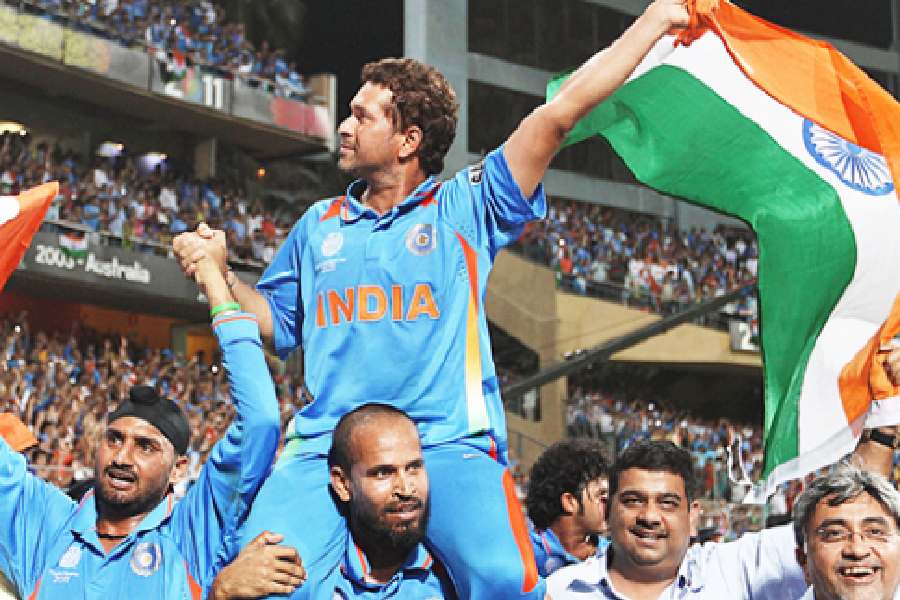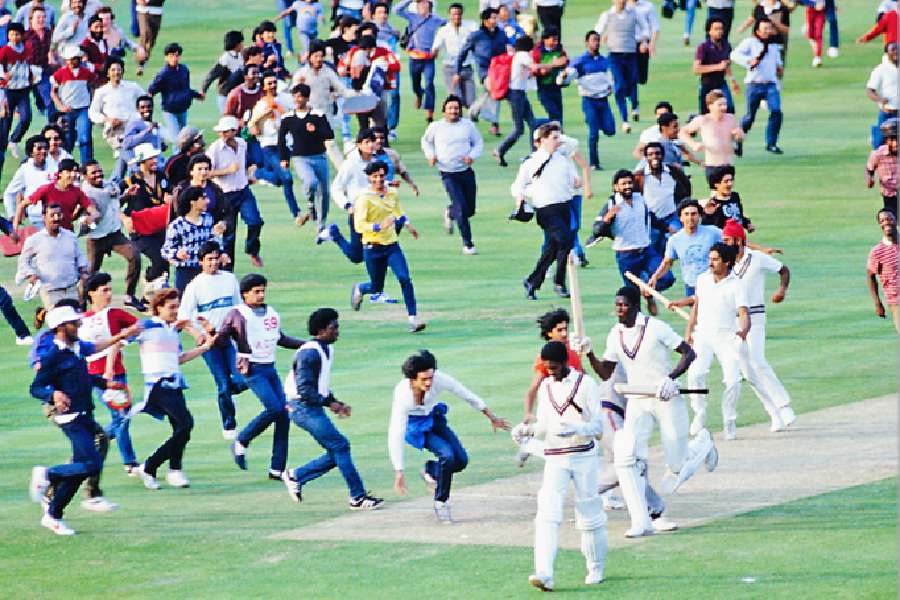ALL-ROUNDER’S PUNCH (1983)
It’s not that it was not known that Kapil Dev was a good all-rounder. But the 1983 World Cup, especially the game against Zimbabwe, elevated Kapil the all-rounder to an entirely different level. His innings of 175 not out after half the side was back in the hut with not even 20 on the board is the stuff of legends.
That innings told the world how dangerous Kapil, the all-rounder, was and, more importantly, must have given the man himself the confidence of a lifetime that he could dent oppositions not only with his swing of the ball, but also by swinging his bat.
THE FINAL PUSH (1983)
When India made the World Cup final in 1983, no one gave them a chance as their opponents were the mighty West Indies, champions of the previous two editions. But this Indian side dreamt big and feared none. Even after managing just 183 batting first, they did not lose hope.
The Windies, despite getting a good start, collapsed after the fall of Viv Richards’ wicket and India went on to win by 43 runs. The win did not just give India their first World Cup, it also made the country fall in love with the game, a love affair that’s still going strong. On the other hand, it proved to the world that the mighty West Indians were beatable.
SWEEP STAKE (1987)
England hosted the first two World Cups but couldn’t win it. They looked good to do it in 1987 but Mike Gatting played one sweep too many in the final against Australia and that triggered their fall. England, who had employed the sweep to good effect in the tournament hosted by India, were cruising at 135/2 chasing 254 when Gatting tried a reverse sweep only to top-edge it to the keeper. That dismissal hampered England’s rhythm and they suffered an agonising seven-run defeat.

FROM THE WORLD CUP ALBUM: (From left) Allan Border and Mike Gatting before the 1987 Cup final, New Zealand’s Dipak Patel celebrates a wicket with teammate Chris Cairns during the 1992 Cup, Zimbabwe’s Henry Olonga sports the black armband as a mark of protest during the 2003 tournament and England’s Ben Stokes reacts after the ball accidentally gets deflected off his bat for four bye runs during the 2019 final against New Zealand. Pictures taken from posts on X and Getty Images
CAPTAIN CURIOUS (1992)
Martin Crowe hardly had the team to dream big at the 1992 World Cup, which New Zealand was co-hosting with Australia. But he had innovative plans to make up for the inadequacies in his team. They didn’t have a standout bowler, but Crowe did not need one.
He used little-known off-spinner Dipak Patel to open the bowling, a move that surprised all his opponents. Then he made maximum use of the slow New Zealand pitches by using the gentle medium pace of Chris Harris and Gavin Larsen to stifle rival batters. He also used Mark Greatbatch’s pinch-hitting skills at the top of the order to hurt bowling attacks. Though New Zealand lost in the semi-final to Pakistan, Crowe’s unique ideas gave captaincy in white-ball cricket a whole new dimension.
UNRULY RULE (1992)
South Africa were well-positioned in the 1992 semi-final against England as they required 23 runs off 13 balls to win. But rain stopped play for 12 minutes and when the game was ready to resume, the scoreboard flashed the new equation — 22 required off one ball. It was utter madness, especially the method to devise the new target. The Proteas had a heartbreaking loss. But it also prompted British statisticians Frank Duckworth and Tony Lewis to come up with an alternative formula and cricket dumped its old rain rules to adopt the Duckworth-Lewis system.
A NEW OPENING (1996)
Before 1996, Sri Lanka were more of a punching bag in world cricket. But two men changed that by throwing counterpunches. Sanath Jayasuriya and Romesh Kaluwitharana — one a part-time left arm orthodox spinner, the other a wicketkeeper — formed a unique opening combination.
While till then opening in ODIs usually meant seeing off the new ball, the Lankan duo went after bowlers like men possessed. Kalu didn’t score too many runs, but Jayasuriya had a blast in the Cup scoring at a strike rate of 131.54. Led by Arjuna Ranatunga, Sri Lanka stunned all to win the World Cup. Openers around the world still follow the template set by Jayasuriya and Kaluwitharana.
CHOKED OUT (1999)
South Africa’s wait for their maiden World Cup triumph seems to be a never-ending vocation. But perhaps it would not have been so had Herschelle Gibbs held on to Steve Waugh’s catch at midwicket during a Super Six match of the 1999 World Cup. Waugh, then on 56, went on to score 120 not out as Australia chased down 272 in the must-win match and reached the semis.
“You’ve just dropped the World Cup,” is what Waugh is thought to have said to Gibbs. But he actually said: “Do you realise you’ve just cost your team the match?” The teams met again in the semi-finals and, as fate would have it, Australia knocked out South Africa, who famously choked in a chase of 213, failing to score one run off four balls.
PROTEST PITCH (2003)
The 2003 World Cup was marked by the brave protest from Zimbabweans Andy Flower and Henry Olonga. Before Zimbabwe’s opening match against Namibia at the Harare Sports Club, Olonga and his white teammate Flower released a statement to the press saying they would be wearing black armbands at the World Cup as a protest against Robert Mugabe’s authoritarian government.
They said they were mourning the “death of democracy” in the country. That effectively ended their international cricket careers and they were forced to flee the country. Zimbabwe cricket lost its edge from that day and it is yet to get back on its feet.
FAIRY-TALE FINISH (2011)
The image of Sachin Tendulkar doing a lap of honour on the shoulders of his young teammates at the Wankhede after India won the 2011 World Cup was a sight that billions of cricket fans in the country and beyond would never forget in their lifetime. It was like a fairy tale, one that existed only in dreams. Sachin had waited for that day all his life.

Sachin Tendulkar does a lap of honour at the Wankhede in Mumbai after India beat Sri Lanka in the 2011 World Cup final
Once Mahendra Singh Dhoni, who had promoted himself up the order in the chase against Sri Lanka, hit the winning runs with a six, the entire country broke into celebration, the likes of which was perhaps not even seen in 1983, when India won their maiden Cup.
BELIEVE IT OR NOT (2019)
The most bizarre yet thrilling World Cup final was played in 2019. At the iconic venue of Lord’s, England, chasing New Zealand’s 241/8, were all out for 241, but not before some lastover drama. Besides Stokes’ brilliant batting, England managed to tie the score only because of a boundary gift that came when the fielder’s throw hit the bat of a diving Stokes and went for a four.
The Super Over followed but even that ended in a tie. Finally, England were declared winners on the boundary count. No one could have ever thought of such a finish. England won their maiden World Cup while the Black Caps, who didn’t deserve to lose, were left heartbroken.










